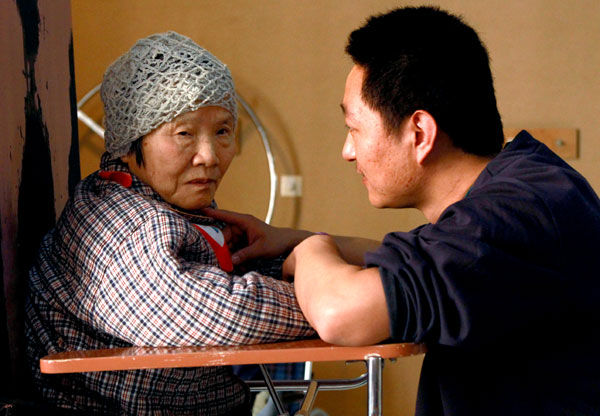

|
 A caretaker at Beijing Intech Nursing Home, a private facility, looks after a resident last week. Feng Yongbin / China Daily |
Xu Renmin's favorite activity is to ride in an elevator, up and down, up and down. He prefers this to joining other patients in the recreation room of a Beijing nursing home. The 73-year-old Alzheimer's sufferer often isolates himself from human contact by plugging cotton balls into his ears.
|
||||
The Chinese Committee for Alzheimer's Disease International estimated that in 2009 China had more than 6 million Alzheimer's patients. Today it's more than 10 million.
Most people in China with Alzheimer's have no insurance or professional help, according to medical and social experts.
"In China's battle against aging, the scariest part is not our enormous and rapidly increasing aged population," said Liu Hongchen, deputy secretary-general of China Aging Development Foundation. "It's how we deal with Alzheimer's and other dementia diseases."
"Once a 90-year-old granny woke up on a peaceful morning and said to me in great fear that an earthquake had happened and she needed to escape from the building," said Zhang Danuo, a full-time volunteer who has looked after 60 to 70 Alzheimer's patients in Beijing Songtang Caring Hospice since 2003.
Zhang, 39, knew from experience that confrontation and correction wouldn't work. So he lied to the woman, telling her that authorities from the Earthquake Administration said there was indeed an earthquake, but it was not a major one and there was no need to panic or escape. "The old granny then loosened her strained nerves and felt safe again," Zhang said.
In another incident, a woman in her 80s begged him to push her into the wall so she could pierce through it and escape. "It is typical for Alzheimer's patients to have hallucinations, to feel suspicious of the environment," Zhang said. "My task is to help relieve their stress."
|
 |
Wang Wenjie's grandaunt started to show symptoms of Alzheimer's disease when she was in her late 70s and Wang was still a little girl. "To prevent her from getting lost outside, we had to lock her inside if we couldn't spare anyone to watch her," said Wang, now 28 and working in a Chinese traditional medicine hospital in Beijing.
"Grandaunt hated it. She swore and said a lot of intolerable things. Sometimes it would break your heart."
One day, Wang's grandmother was alone with the grandaunt, Wang Ru, and locked her up so she could cook lunch in the kitchen. When Wang and her family came home, they found Wang Ru shouting and swearing as expected. Grandmother lay on the living room floor, dead from a heart attack.
"It is almost impossible and intolerable for ordinary family to care for Alzheimer's patients," Wang said. "They'd better seek professional help."